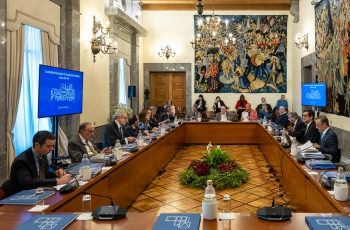Porto's Economic Development Strategy was under analysis in 'Casa dos 24'.

Porto.
· 29 Apr 2022
The Municipal Council of Economy met on Wednesday, at Paços do Concelho, to analyse the Economic Development Strategy of Porto, a document that establishes a vision for the period until 2035.
After having been presented to the Municipal Executive, in March, Porto's Economic Development Strategy was analysed this Wednesday, in a meeting of the Municipal Council of Economy/"Casa dos 24". The meeting served to approach the document and collect the councillors' contributions.
In a brief presentation, the Councillor for Economy, Employment and Entrepreneurship revealed that the document will be called "Pulsar Porto", and listed some of the guidelines. The time frame of this strategy is now 2035, and not 2030, as initially outlined: "We want to have a vision for a slightly longer period", underlined Ricardo Valente.
"Our city is extremely relevant from an economic and social point of view. We face the challenge of an ageing population, but the population loss has been stemmed. The talent hub is our great asset," emphasised the councillor, highlighting the higher education institutions and the talent that it has been possible to attract. "The city has been attracting a number of investments in the area of technologies, we have data indicating that the gross value added of foreign companies is 23% of the total," he added.
"We want to move from 'More Porto' to 'Better Porto'. To make a qualitative leap," Ricardo Valente emphasised, guaranteeing that the aim is to involve the partners. "We want to create a governance model to manage the 'Pulsar'. We want to have a body with executive competencies, which is responsible for the implementation of this plan. An agile, representative and focused structure. There will be a board of directors that will be the effective leadership of this plan. We want this to be a strategic plan for the city, not a municipal plan", he concluded.
The Mayor of Porto, Rui Moreira, highlighted the role of InvestPorto in attracting investment: "Porto is not a tax haven, and yet it is managing to attract foreign investment," he congratulated.
Admitting that the geographical dimension turns the city "into an island", Rui Moreira added that "this concern could be mitigated by the geography of the metropolitan area". However, the mayor regretted that "metropolitan areas are political bodies, they do not have a budgetary dimension. This is a very strong concern of ours. And the socio-political geography of the metropolitan area is not homogeneous".
The city's economic growth will have to be based on vectors such as sustainability or talent, the councillors agreed. "And also mobility," added Rui Moreira: "We have been taking tough, and often misunderstood, measures to ensure we have low rates of road accidents. There is a lot of talk about safety, but road accidents are intolerable in a city. It penalises electorally, but the aim is to protect people. The idea that the city is the Wild West and the car is Lucky Luke's horse no longer applies," he stressed.
"But sustainability cannot just be something at the level of our car, we have to go a bit further. We have active health promotion policies for senior citizens: outdoor activities, in parks...", he added.
The meeting of the Municipal Council of Economy was also attended by the President of the Municipal Assembly, Sebastião Feyo de Azevedo. The new members of the "Casa dos 24" took office, namely the former president of the Northern Regional Coordination and Development Commission, Fernando Freire de Sousa.
The elaboration of Porto's Economic Development Strategy resulted from an initiative of the Municipal Council of Economy and will count on the contributions of the councillors, who in the next few weeks will study the document and present their suggestions at the next meeting of this advisory board.
